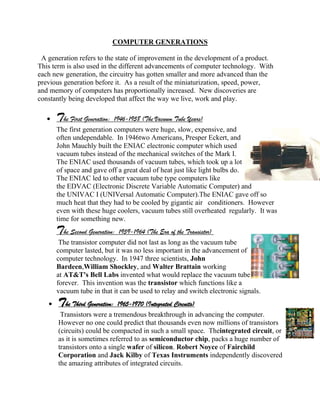
Computer generation1
- 1. COMPUTER GENERATIONS A generation refers to the state of improvement in the development of a product. This term is also used in the different advancements of computer technology. With each new generation, the circuitry has gotten smaller and more advanced than the previous generation before it. As a result of the miniaturization, speed, power, and memory of computers has proportionally increased. New discoveries are constantly being developed that affect the way we live, work and play. The First Generation: 1946-1958 (The Vacuum Tube Years) The first generation computers were huge, slow, expensive, and often undependable. In 1946two Americans, Presper Eckert, and John Mauchly built the ENIAC electronic computer which used vacuum tubes instead of the mechanical switches of the Mark I. The ENIAC used thousands of vacuum tubes, which took up a lot of space and gave off a great deal of heat just like light bulbs do. The ENIAC led to other vacuum tube type computers like the EDVAC (Electronic Discrete Variable Automatic Computer) and the UNIVAC I (UNIVersal Automatic Computer).The ENIAC gave off so much heat that they had to be cooled by gigantic air conditioners. However even with these huge coolers, vacuum tubes still overheated regularly. It was time for something new. The Second Generation: 1959-1964 (The Era of the Transistor) The transistor computer did not last as long as the vacuum tube computer lasted, but it was no less important in the advancement of computer technology. In 1947 three scientists, John Bardeen,William Shockley, and Walter Brattain working at AT&T's Bell Labs invented what would replace the vacuum tube forever. This invention was the transistor which functions like a vacuum tube in that it can be used to relay and switch electronic signals. The Third Generation: 1965-1970 (Integrated Circuits) Transistors were a tremendous breakthrough in advancing the computer. However no one could predict that thousands even now millions of transistors (circuits) could be compacted in such a small space. Theintegrated circuit, or as it is sometimes referred to as semiconductor chip, packs a huge number of transistors onto a single wafer of silicon. Robert Noyce of Fairchild Corporation and Jack Kilby of Texas Instruments independently discovered the amazing attributes of integrated circuits.
- 2. The Fourth Generation: 1971-Today (The Microprocessor) This generation can be characterized by both the jump to monolithic integrated circuits(millions of transistor s put onto one integrated circuit chip) and the invention of the microprocessor (a single chip that could do all the processing of a full-scale computer). By putting millions of transistors onto one single chip more calculation and faster speeds could be reached by computers. Because electricity travels about a foot in a billionth of a second, the smaller the distance the greater the speed of computers. Today we have all heard of Intel and its Pentium Processors and now we know ® how it all got started. The computers of the next generation will have millions upon millions of transistors on one chip and will perform over a billion calculations in a single second. There is no end in sight for the computer movement.
